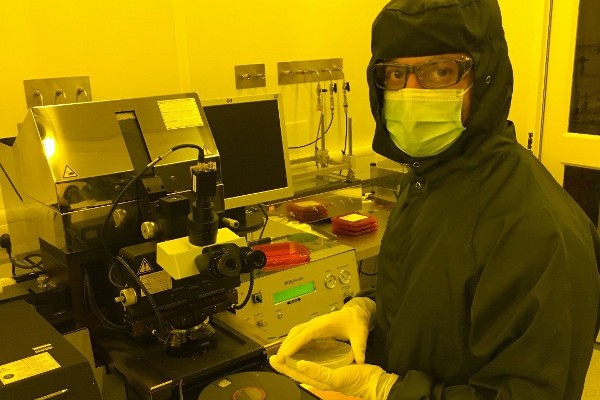
Dr Sinan Bugu has been awarded a Marie Skłodowska-Curie Actions (MSCA) Postdoctoral Fellowship for DEMETER.
Classical computers require tremendous time to solve common computational tasks such as poorly formatted database searches and the ability to generate strong passwords using the process of factorisation. To achieve advantages beyond the capabilities of any classical computer the quantum research community, together with major national and international programmes such as the EU Quantum Technologies Flagship, are focusing on developing an alternative solution: the quantum computer. However, this exploration is at an early stage where many quantum researchers are faced with considerable challenges and barriers, including, coherence, time and operation fidelity, together with repeatability and scalability in fabrication processes.
Dr Bugu’s Marie Skłodowska-Curie Actions Postdoctoral Fellowship DEMETER, awarded with a top score of 96/100, merges his experiences across the fields of condensed physics, mathematics and electrical and electronic engineering, culminating in a timely project addressing key questions to overcome limitations in coherence time, single-gate operation frequency, and scalable readout associated with challenges in realising practical quantum computers. DEMETER builds on the complementarity of Dr Bugu’s strengths, the leading CMOS compatible fabrication expertise and infrastructure at Tyndall and ‘know-how’ in quantum information processing afforded by an exciting secondment at the high-potential UK SME - Quantum Motion. Dr Bugu will use Germanium (Ge) as an emerging quantum material platform to realise Ge-hole spin qubits in strained Ge/SiGe heterostructures and unprecedented geometry formed in the underlying Ge.

DEMETER’s science and technology objectives are to achieve advances in coherence time, fast qubit operation and fast readout thanks to radiofrequency based reflectometry techniques, and to contribute towards the scalability of quantum microchips. DEMETER outcomes will provide a pathway towards scaling up quantum systems to attain a universal quantum computer.
Dr Bugu has designed the proposed work plan with the DEMETER team to: (i) achieve scientific and technical goals beyond the state-of-the-art in Ge-based QD systems for QIP, in collaboration with commercial partners; (ii) strengthen and add further to his core technical skills; and (iii) enhance his independence and profile by combining professional development with delivery of timely and impactful results.
DEMETER’s research objectives can only be achieved in an advanced infrastructure supported by a broader teamwork environment. Hosted at Tyndall and adhering to MSCA supervisor guidelines, Dr Bugu will work under the supervision of Dr Giorgos Fagas and in close collaboration with Drs Ray Duffy and Nikolay Petkov.
Dr Bugu will receive guidance in modelling and simulation in mesoscopic quantum physics but most importantly will further develop his research management skills and network on quantum technologies under the supervision of Dr Fagas, who is Head of the CMOS++ Research Cluster (approx. 40 researchers) at Tyndall and a member of Tyndall’s Institutional Leadership Team.
Dr Duffy is embedded as a Principal Researcher in the CMOS++ Research Cluster and QCEC and is also a Fellow in UCC’s School of Engineering. He will offer expertise in Ge processing, materials analysis, device fabrication, and device characterisation, demonstrated in more than 50 papers in the Ge or Ge-alloy area.
Dr Petkov is a staff researcher at Tyndall leading research area in advanced electron microscopy for analysis of semiconductor materials & devices and will provide expertise in nanofabrication of devices and their structural analysis.
Commenting on the award, Dr Bugu said:
“My ambition is to become a leading theoretical and experimental scientist in the field of quantum information processing, to contribute key insights in the development of technologies and their engineering using novel materials, device architectures and metrology methods. My career goal is to become a recognised research leader, capable of leading and growing my own team.
My career development will benefit from the supervision of Dr Giorgos Fagas, an established leader at Tyndall, the Irish quantum technologies community and the EU landscape, as well as the research expertise of his group members, Drs Ray Duffy and Nicolay Petkov, in processing Ge nanostructures. During my secondment, I will be working closely with Dr Fernando Gonzalez-Zalba, a leading researcher in gate-based sensing reflectometry. The goal of the Fellowship matches the urgent need to support the EU Quantum Technologies flagship and foster leading expertise in quantum computing. My MSC award will accelerate my ambitions for European Research Council (ERC) grant.”
Commenting on the award, Dr. Fagas, Head of CMOS++ and EU Programmes, said:
“Dr Bugu is highly motivated and passionate with an impressively rich track record in the field of quantum technologies as a theoretician and experimentalist. His joining our team will be highly beneficial not only for achieving our objectives of a scalable quantum computing architectures but also to realise the vision of our recently launched Quantum Computer Engineering Centre (QCEC). QCEC’s mission is to lead a global open innovation hub for deep-tech quantum computer engineering, spanning materials to devices to systems and to grow globally competitive quantum engineering talent.”
